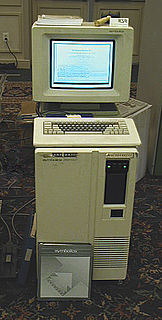
Computer science is the study of processes that interact with data and that can be represented as data in the form of programs. It enables the use of algorithms to manipulate, store, and communicate digital information. A computer scientist studies the theory of computation and the practice of designing software systems.
Computer science is no more about computers than astronomy is about telescopes.

In artificial intelligence, an expert system is a computer system that emulates the decision-making ability of a human expert. Expert systems are designed to solve complex problems by reasoning through bodies of knowledge, represented mainly as if–then rules rather than through conventional procedural code. The first expert systems were created in the 1970s and then proliferated in the 1980s. Expert systems were among the first truly successful forms of artificial intelligence (AI) software. An expert system is divided into two subsystems: the inference engine and the knowledge base. The knowledge base represents facts and rules. The inference engine applies the rules to the known facts to deduce new facts. Inference engines can also include explanation and debugging abilities.

Wolfram Mathematica is a modern technical computing system spanning most areas of technical computing - including neural networks, machine learning, image processing, geometry, data science, visualizations, and others. The system is used in many technical, scientific, engineering, mathematical, and computing fields. It was conceived by Stephen Wolfram and is developed by Wolfram Research of Champaign, Illinois. The Wolfram Language is the programming language used in Mathematica.
A computer algebra system (CAS) is any mathematical software with the ability to manipulate mathematical expressions in a way similar to the traditional manual computations of mathematicians and scientists. The development of the computer algebra systems in the second half of the 20th century is part of the discipline of "computer algebra" or "symbolic computation", which has spurred work in algorithms over mathematical objects such as polynomials.

A New Kind of Science is a best-selling, controversial book by Stephen Wolfram, published by his own company in 2002. It contains an empirical and systematic study of computational systems such as cellular automata. Wolfram calls these systems simple programs and argues that the scientific philosophy and methods appropriate for the study of simple programs are relevant to other fields of science.

Wolfram Research is a private company that creates computational technology. Wolfram's flagship product is the technical computing program Wolfram Mathematica, first released on June 23, 1988. Wolfram Research founder Stephen Wolfram is the CEO.
The expression computational intelligence (CI) usually refers to the ability of a computer to learn a specific task from data or experimental observation. Even though it is commonly considered a synonym of soft computing, there is still no commonly accepted definition of computational intelligence.
Mathematical software is software used to model, analyze or calculate numeric, symbolic or geometric data.
Human-based computation (HBC), human-assisted computation, ubiquitous human computing or distributed thinking is a computer science technique in which a machine performs its function by outsourcing certain steps to humans, usually as microwork. This approach uses differences in abilities and alternative costs between humans and computer agents to achieve symbiotic human–computer interaction.
The terms design computing and other relevant terms including design and computation and computational design refer to the study and practice of design activities through the application and development of novel ideas and techniques in computing. One of the early groups to coin this term was the Key Centre of Design Computing and Cognition at the University of Sydney in Australia, which for nearly fifty years pioneered the research, teaching, and consulting of design and computational technologies. This group organised the academic conference series "Artificial Intelligence in Design (AID)" published by Springer during that period. AID was later renamed "Design Computing and Cognition (DCC)" and is currently a leading biannual conference in the field. Other notable groups in this area are the Design and Computation group at Massachusetts Institute of Technology's School of Architecture + Planning and the Computational Design group at Georgia Tech.
In his book A New Kind of Science, Stephen Wolfram described a universal 2-state 5-symbol Turing machine, and conjectured that a particular 2-state 3-symbol Turing machine might be universal as well.
In education, computational thinking (CT) is a set of problem-solving methods that involve expressing problems and their solutions in ways that a computer could execute.. It involves the mental skills and practices for 1) designing computations that get computers to do jobs for us, and 2) explaining and interpreting the world as a complex of information processes. Those ideas range from basic CT for beginners to advanced CT for experts.

Scott Joel Aaronson is an American theoretical computer scientist and David J. Bruton Jr. Centennial Professor of Computer Science at the University of Texas at Austin. His primary areas of research are quantum computing and computational complexity theory.
Wolfram|Alpha is a computational knowledge engine or answer engine developed by Wolfram Alpha LLC, a subsidiary of Wolfram Research. It is an online service that answers factual queries directly by computing the answer from externally sourced "curated data", rather than providing a list of documents or web pages that might contain the answer as a search engine might.
This glossary of artificial intelligence terms is about artificial intelligence, its sub-disciplines, and related fields.

A notebook interface is a virtual notebook environment used for literate programming. It pairs the functionality of word processing software with both the shell and kernel of that notebook's programming language. Millions of people use notebooks interfaces to analyze data for science, journalism, and education.
Most of the terms listed in Wikipedia glossaries are already defined and explained within Wikipedia itself. However, glossaries like this one are useful for looking up, comparing and reviewing large numbers of terms together. You can help enhance this page by adding new terms or writing definitions for existing ones.








